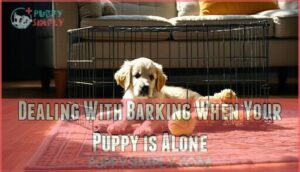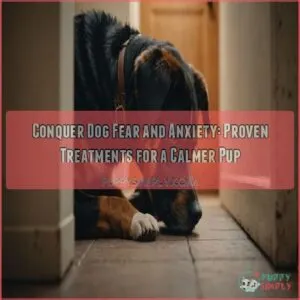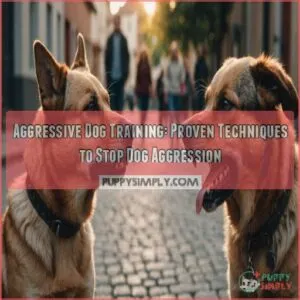This site is supported by our readers. We may earn a commission, at no cost to you, if you purchase through links.
 You can stop puppy howling and barking by understanding why it’s happening first. Puppies bark from excitement, worry, or seeking attention.
You can stop puppy howling and barking by understanding why it’s happening first. Puppies bark from excitement, worry, or seeking attention.
Use positive reinforcement to reward quiet behavior, and ignore the noise when they’re demanding attention. Create a calm environment with consistent routines, plenty of exercise, and mental stimulation through puzzle toys.
Redirect their energy with training commands like "quiet" or "sit." For nighttime howling, make certain they’re comfortable with proper bedding and gradual crate training.
Don’t yell back – that just adds to the chaos. The key is patience and consistency in your approach. Different triggers require specific strategies to tackle effectively.
Table Of Contents
- Key Takeaways
- Puppy Barking: Understanding The Science
- Controlling Puppy Barking: Worry Vs. Excitement
- Why Do Puppies Bark?
- How to Stop Puppy Barking Due to Worry
- How to Stop Puppy Barking Due to Excitement
- Dealing With Barking When Your Puppy is Alone
- Medical Causes of Excessive Barking
- Why Do Puppies Howl?
- Addressing Puppy Whining and Crying at Night
- Frequently Asked Questions (FAQs)
- How to stop a dog from Barking?
- Why is my dog barking & howling?
- How do you stop a puppy howling?
- Should I punish my dog for Howling?
- When does a puppy start barking and howling?
- How can I stop my Dog from Howling at night?
- What is the Best Way to Reinforce Positive Behavior in Puppies?
- How Can I Tell the Difference Between Natural and Learned Puppy Howling?
- What Should I Do if My Puppy Barks Excessively at Strangers?
- How do I get a puppy to stop howling?
- Conclusion
Key Takeaways
- Understand the root cause first – You’ll need to identify whether your puppy’s barking stems from anxiety, excitement, or attention-seeking, since each trigger requires different training approaches and solutions.
- Use positive reinforcement consistently – Reward quiet behavior immediately with treats and praise, while ignoring attention-seeking barking completely to avoid accidentally reinforcing the unwanted behavior.
- Create structure and mental stimulation – Establish consistent daily routines, provide plenty of exercise, and use puzzle toys or interactive feeders to prevent boredom-related barking and howling.
- Stay patient and consistent – Don’t yell back or punish your puppy, as this adds to the chaos – instead, practice commands like "quiet" regularly and maintain the same approach across all family members.
Puppy Barking: Understanding The Science
Your puppy’s barking isn’t random noise—it’s sophisticated canine communication with deep evolutionary roots.
Understanding the science behind puppy barking helps you address the behavior effectively rather than fighting against natural instincts.
Vocalization development begins early, with puppies using different bark types to communicate specific needs. Each bark serves distinct barking purposes: alerting you to threats, expressing excitement, or seeking attention.
Breed predisposition plays a significant role—some breeds naturally bark more due to their genetic makeup and original working functions.
Barking triggers vary widely, from environmental stimuli to emotional states. Your puppy’s brain processes these triggers and responds through vocalization, making it essential canine communication. Research shows that puppies learn to modify their barking based on your responses, which explains why consistent puppy training approaches work better than random corrections.
Recognizing these patterns gives you the foundation for effective dog barking solutions. This understanding is crucial for developing a strategy that works with your puppy’s natural instincts, rather than against them, and helps in creating a more harmonious relationship between you and your puppy through effective communication and consistent training.
Controlling Puppy Barking: Worry Vs. Excitement
You’ll need to identify whether your puppy’s barking stems from worry or excitement, since each requires different training approaches.
Understanding the root cause helps you choose the right distraction techniques and calmness training methods that work effectively for your specific situation.
Distraction Techniques
When your puppy’s barking becomes overwhelming, distraction techniques offer immediate relief.
These methods redirect your pup’s attention from triggers that cause worry or excitement, making them essential tools in your puppy training arsenal.
Toy redirection works particularly well during episodes of puppy barking.
Keep squeaky toys or rope toys nearby to capture your dog’s focus.
Sound aversion techniques, like shaking a can with coins, can interrupt unwanted vocalizations without harsh corrections.
| Distraction Method | Best For |
|---|---|
| Puzzle toys | Mental stimulation during quiet time |
| Calming chews | Reducing anxiety-based puppy howling |
| Scent enrichment | Redirecting attention from outdoor triggers |
| Interactive feeders | Preventing boredom barking |
Scent enrichment using treats hidden around your home engages your puppy’s natural hunting instincts.
Calming chews containing ingredients like chamomile help anxious pups settle down.
To further minimize barking, consider positive reinforcement training by rewarding quiet behavior.
Remember, successful distractions require timing—intervene before your puppy becomes completely overwhelmed by whatever’s bothering them.
Training for Calmness
Beyond distraction techniques, building lasting calmness requires systematic training that addresses your puppy’s emotional state. Teaching your pup to settle down isn’t about quick fixes—it’s about creating positive associations with quiet behavior.
Reward quiet moments immediately with treats or praise. When your puppy stops barking, even for a second, mark that behavior. This builds their understanding that silence brings good things.
| Training Method | Implementation |
|---|---|
| Crate association | Make the crate cozy with blankets and toys |
| Exercise importance | Tire them out before training sessions |
| Mental stimulation | Use puzzle toys and training games |
| Routine establishment | Consistent daily schedule reduces anxiety |
Stop puppy barking by combining dog training tips with patience. Comfortable crate bedding can substantially improve a puppy’s sense of security. Calming puppy techniques work best when you understand that puppy behavior stems from their need for security and structure in their new world.
Why Do Puppies Bark?
Behind every bark lies a message your puppy’s trying to deliver. Barking triggers include fear, excitement, boredom, and attention-seeking behaviors that drive puppy barking patterns.
Communication needs vary as puppies use different vocal tones to express emotions or alert you to changes. Breed tendencies also play a role—some dogs naturally vocalize more than others.
Environmental factors like new sounds, visitors, or separation can prompt excessive barking episodes. Understanding puppy development helps you recognize normal puppy behavior versus concerning patterns requiring dog training tips and intervention strategies.
How to Stop Puppy Barking Due to Worry
Fear-based barking stems from puppy anxiety and stress when your pup encounters unfamiliar situations.
Fear-driven barks reveal your puppy’s need for comfort and security in an overwhelming world.
Creating safe spaces helps nervous puppies feel secure while building their confidence gradually.
Here’s how to address anxiety triggers effectively:
- Maintain distance from scary stimuli and reward calm behavior immediately
- Use gradual exposure to slowly introduce triggers at comfortable distances
- Create safe spaces with crates or quiet rooms where your puppy can retreat
- Practice confidence building through short, positive training sessions
- Stay patient – fearful puppies need time to overcome separation anxiety and develop trust
How to Stop Puppy Barking Due to Excitement
When your puppy barks from excitement, you’ll need to resist the urge to engage with them, as this reinforces the behavior you’re trying to stop.
Instead, you can redirect their energy by teaching specific commands and rewarding calm behavior to help them learn appropriate responses to exciting situations.
Ignoring and Redirecting Behavior
When your puppy’s excitement turns into excessive barking, consistent ignoring becomes your most powerful tool. Don’t give attention seeking behavior the reaction it craves. Turn your back, avoid eye contact, and stay silent until the noise stops.
This isn’t cruel—it’s teaching your pup that barking won’t get results. Redirecting aggression or overstimulation works better than punishment. Keep boredom busters like puzzle toys and chew bones handy.
The moment your puppy starts barking from excitement, immediately offer alternative activities. A frozen Kong or interactive toy can shift their focus instantly. To help with redirection, consider providing them with safe and durable options.
Timing matters most. You’ve got about three seconds to redirect before the barking becomes a habit. Practice this during calm moments so you’re ready when excitement strikes. Remember, every time you accidentally reward puppy howling with attention, you’re training them to bark more.
Stay consistent, and you’ll stop puppy barking faster than you think. This approach requires patience and understanding that every interaction counts, and by following these steps, you can help your puppy learn that barking is not an effective way to get attention.
Teaching Commands
Once you’ve mastered ignoring unwanted behavior, it’s time to give your puppy clear instructions they can follow. Teaching the "speak command" and "quiet command" transforms chaos into controlled communication.
Start with the speak command during natural barking moments, then immediately follow with the quiet command when they stop. Command timing makes all the difference – reward the instant they comply.
Command consistency across all family members prevents confusion. When your puppy understands these basic commands, you’ll stop puppy barking and puppy howling on cue.
Here’s your training toolkit:
- Use high-value treats during initial command training sessions
- Practice commands during calm moments, not mid-tantrum
- Keep training sessions short (5-10 minutes) for better focus
- Reward immediately when they respond to the quiet command
- Practice daily until commands become second nature
Positive reinforcement works faster than punishment. Your puppy wants to please you – give them the roadmap to success.
Dealing With Barking When Your Puppy is Alone
Puppy barking when alone often stems from separation anxiety or boredom barking.
Start with gradual departure training – leave for just minutes, then slowly increase time.
Crate training provides security, but add comfort items like your worn shirt or favorite toy.
Create mental stimulation with puzzle feeders and interactive toys to combat puppy loneliness.
Consider using enrichment feeding options to keep them occupied.
Exercise your pup beforehand so they’re tired enough to rest.
For severe puppy anxiety relief, practice short absences while you’re home first.
This builds confidence before real departures, helping stop puppy barking effectively.
Medical Causes of Excessive Barking
Sometimes excessive barking isn’t just behavioral—it’s your puppy’s way of telling you something’s wrong. Medical causes require immediate veterinary attention to rule out underlying health problems before assuming it’s just bad behavior.
Here are key medical triggers to watch for:
- Pain indicators like dental problems, ear infections, or injury causing discomfort
- Cognitive dysfunction in older puppies affecting brain function and communication
- Neurological disorders or thyroid issues disrupting normal behavior patterns
Don’t ignore sudden changes in your puppy’s vocalization patterns—they’re often health red flags. Addressing anxiety-related barking might also require medical intervention.
Why Do Puppies Howl?
The mystery behind puppy howling often puzzles new dog owners, but understanding the root causes makes training easier.
Your pup’s vocalizations stem from natural instincts, learned behaviors, and emotional responses that require different approaches.
Here are five key reasons puppies howl:
- Breed Predisposition – Huskies and Beagles naturally howl due to their genetic makeup and pack mentality heritage
- Sound Sensitivity – High-pitched noises like sirens trigger instinctual responses in many puppies
- Expressing Happiness – Excited howling often occurs during playtime or when you return home
- Medical Reasons – Pain, discomfort, or cognitive issues can cause sudden vocalization changes
- Communication Needs – Loneliness, attention-seeking, or territorial behavior drives most puppy howling episodes
Addressing Puppy Whining and Crying at Night
Nighttime crying from your puppy often stems from separation anxiety, bathroom needs, or unfamiliarity with their new environment.
Crate Comfort becomes essential—place familiar-scented items inside and position the crate near your bed initially.
Potty Breaks should happen quietly without playtime, while Ignoring Cries prevents reinforcing attention-seeking behavior.
A consistent Nighttime Routine with scheduled feeding and bathroom times promotes Anxiety Reduction.
Address puppy crying through patience and consistency rather than immediate comfort.
| Issue | Solution | Timeline |
|---|---|---|
| Puppy whining for attention | Ignore non-urgent cries | 1-2 weeks |
| Nighttime barking from fear | Gradual puppy crate training | 2-4 weeks |
| Bathroom accidents | Structured puppy nighttime routine | 3-5 days |
Frequently Asked Questions (FAQs)
How to stop a dog from Barking?
Stop rewarding barking with attention, even negative reactions.
Teach "quiet" commands using treats when they’re silent.
Address underlying causes like boredom, fear, or medical issues.
Consistency and positive reinforcement work better than punishment.
Why is my dog barking & howling?
Your dog’s barking signals needs, fears, or excitement.
Howling expresses loneliness, responds to sounds, or mimics natural instincts.
Both behaviors communicate emotions, seek attention, or alert you to perceived threats in their environment, which can include signals of fears.
How do you stop a puppy howling?
Ignore attention-seeking howls completely, then reward quiet moments with treats.
Make certain your puppy’s needs are met first – potty, food, water.
Use crate training near your bed to reduce nighttime anxiety and loneliness.
Should I punish my dog for Howling?
Punishment becomes a storm cloud over your puppy’s trust.
Don’t scold your dog for howling—it’ll backfire and create anxiety.
Instead, redirect attention, reward quiet moments, and address underlying needs like boredom, loneliness, or medical issues through positive training methods.
When does a puppy start barking and howling?
Puppies typically begin barking around 4-6 weeks old, with howling emerging slightly later at 6-8 weeks.
You’ll notice these vocalizations develop as their hearing improves and they start communicating with littermates and humans, which involves barking.
How can I stop my Dog from Howling at night?
Place your dog’s crate near your bedroom to reduce separation anxiety.
Make certain they’ve had a potty break, then ignore nighttime howling if needs are met.
Consistency helps them learn independence and settle down faster.
What is the Best Way to Reinforce Positive Behavior in Puppies?
Like planting seeds in fertile soil, rewarding your puppy immediately when they’re quiet creates lasting behavioral growth.
Use treats, praise, and play within seconds of good behavior.
Consistency turns these positive moments into permanent habits.
How Can I Tell the Difference Between Natural and Learned Puppy Howling?
Natural howling happens when you’re away or hear sirens—it’s instinctive breed behavior.
Learned howling occurs when you respond with attention, treats, or comfort, accidentally teaching your pup that howling gets results.
What Should I Do if My Puppy Barks Excessively at Strangers?
When your Golden Retriever puppy barks at the mail carrier daily, you’re seeing reactive behavior.
Stay calm, redirect with treats, and reward quiet moments.
Don’t yell—that reinforces the barking, consistent positive training works better.
How do I get a puppy to stop howling?
Ignore your puppy’s attention-seeking howls when their basic needs are met.
Reward quiet moments with treats and praise.
Establish consistent routines, provide mental stimulation, and verify they’re not howling due to pain or separation anxiety.
Conclusion
Remarkably, success in how to stop puppy howling and barking coincides with your commitment to consistency. You’ve learned that understanding triggers—whether anxiety, excitement, or attention-seeking—guides your response strategy.
Positive reinforcement works better than punishment, while proper exercise and mental stimulation prevent many issues.
Remember that patience pays off as your puppy matures. With these proven techniques, you’ll create a peaceful home environment where both you and your furry companion can thrive together harmoniously.














